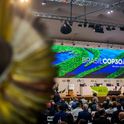©APAPictureDesk/REX/Shutterstock
If I ruled the world, the first thing I would do is tackle environmental issues. There is interest in exploring drilling opportunities in the Arctic which is, as far as I can see, completely unnecessary. An accident could ruin one of the last untouched areas in the world. I’m from Norway and so I feel very emotional about this. In fact, I would stop drilling for oil full stop. The whole idea of an oil-driven society is a bad one.
In addition, I would ban all cars and airplanes—there would be trains and bikes, and that’s it. Maybe some people would say we would be moving backwards, but that’s not necessarily the case: it would help us to stop climate change. When I’ve said things like this before, people have accused me of being reactionary—to which I say, “Yes, I am reactionary.” But my nostalgia doesn’t go back just to the 18th and 19th centuries; it goes back thousands of years. All these species are disappearing, the rainforest is being cut down, the human world is dominating even more, and I feel an instinctive sorrow about that.
Although I would do all this if I ruled the world, right now I take advantage of all the comforts of modernity. I really love driving my car. I drink milk, I buy cheap meat, travel all over the world. I do all those things even though I know that’s a problem. All we’re doing is making things more and more effortless, more and more painless. When I was a child we had to make the effort to read books. My children use computer screens to give them instant satisfaction. I’m not sure I can rule the world, when I can’t even rule my own family!
I’ve been talking with environmental people, and what they say is that we should have a dictatorship because this is the only way you could change the situation, because people don’t want to sacrifice what they have—but in reality that would be crazy.
Another issue is that so many things are changing right now with the mass movement of people into Europe. It’s something you really have to want to make work. I live in Sweden, in a village of around 350 people, and we have had about 35 people coming in, young men from Afghanistan or somewhere similar. This is happening all over the country. These people have to be welcomed. But there is a problem if they are sealed off from the wider population. And that’s what is happening, they have been sealed off, which leads to rage, conflict and division. As a politician or leader you have to see that coming and deal with it. The problem is not immigration, it’s the way it’s dealt with.
If I ruled the world, I would recognise that this is going to need a lot of resources. And you have to be willing to pay that price. It’s so important because it’s dangerous when you have a society in which people are not connected to each other—where large groups of people don’t identify with the common project, the common “we.” At the moment we’re just hoping for the best when we should be confronting all aspects of it. That means both confronting prejudice and if something bad happens not hiding it away, which is what has happened in Sweden regarding sex attacks by migrants.
Recently, I’ve been reading and writing about Anders Behring Breivik, the Norwegian far-right gunman who killed 77 people in 2011. On that day I felt such a pull towards the collective “we”: that was the first time I felt a strong sense of belonging to Norway. That was a good way of dealing with a terrible thing. Even though Breivik was a terrorist, he wasn’t totally alien to me. I can easily relate to everything in his life, until he did what he did. But the people who carried out the terrorist attacks in Paris? I know nothing about them. I don’t know who their parents were, I don’t know who their siblings were, where they went to school.
I am worried about the rise of far-right political parties. But you need to understand their point of view and not try and exclude it. Although I recognise this is very idealistic, I still believe it.
Karl Ove Knausgaard is
a Norwegian author. His
latest novel “Some Rain Must Fall,” is the fifth book of his “My Struggle” series published by Harvill Secker












